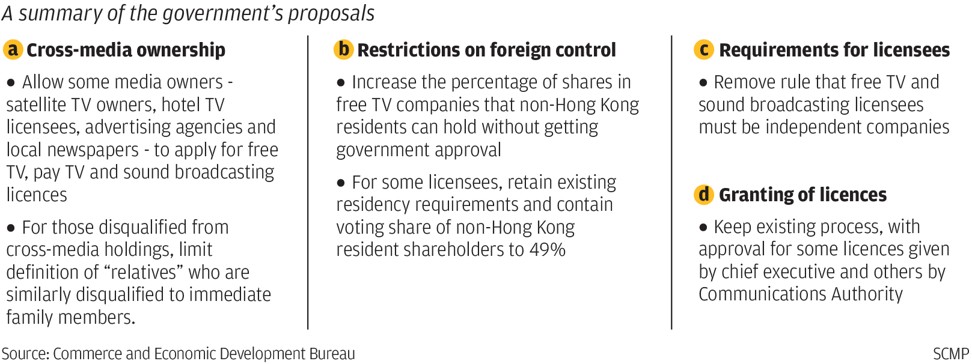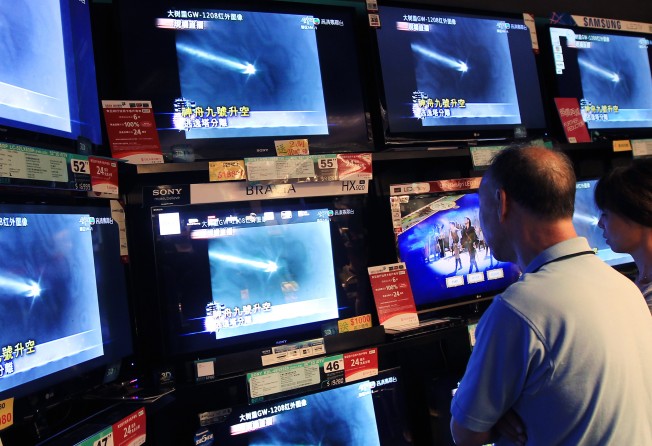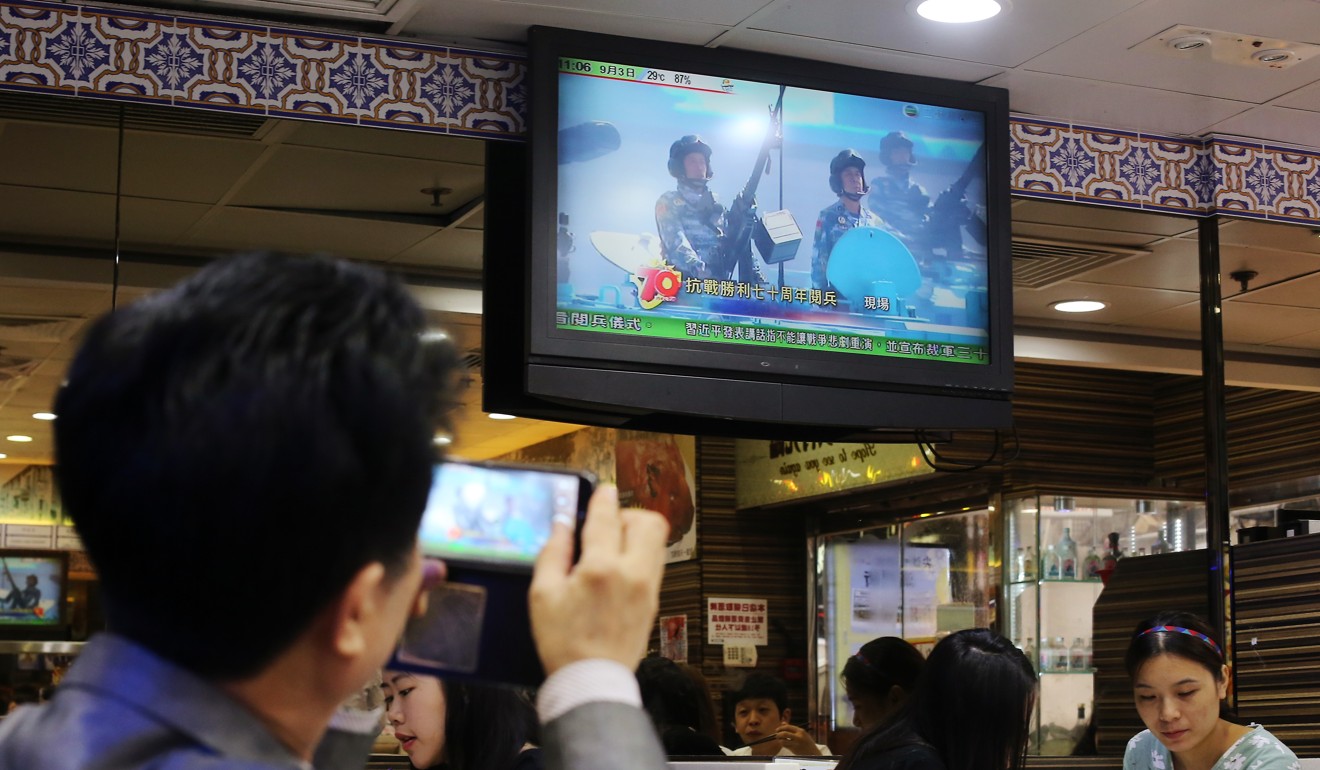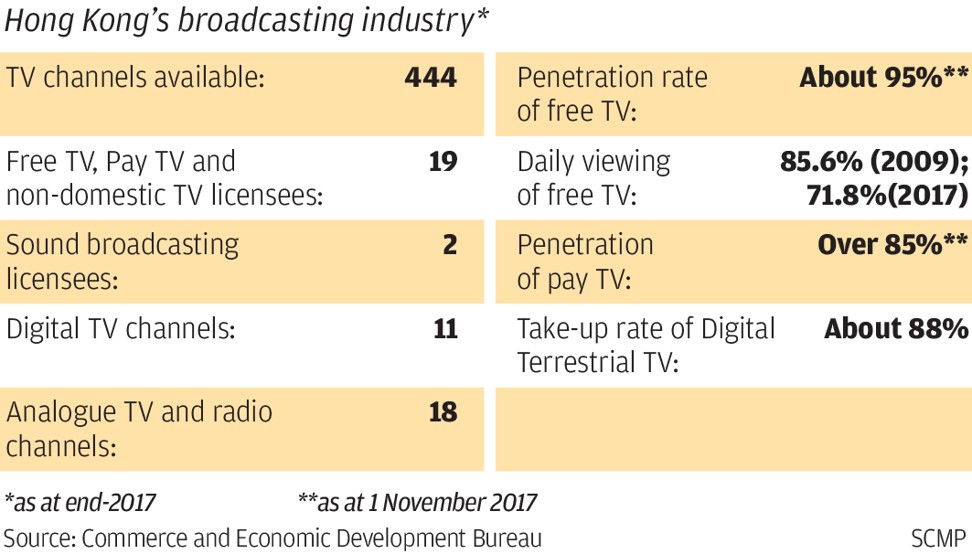
Hong Kong to liberalise rules for cross-media ownership in first major broadcasting policy change in 17 years
Proposal by government would allow some media owners to acquire other broadcasting licences, in bid to encourage innovation and investment in the industry

Cross-media ownership rules in Hong Kong will finally be liberalised under proposed changes to broadcasting regulations widely viewed as outdated since they have remained unchanged for 17 years.
If the suggested changes, laid out in a public consultation document released on Tuesday by the government, are approved by the Legislative Council, newspaper owners, advertising agencies and other media companies will be able to get into the free TV, pay TV or radio broadcasting business.
They had previously been banned from cross-media holdings to avoid editorial uniformity and a potential industry monopoly, but a rapidly changing media landscape and technological advances have prompted a total rethink.
However, the ban on awarding new broadcasting licences will remain in place for those already running free TV, pay TV or radio businesses.
And individuals who have yet to gain permanent residency through seven consecutive years of living in Hong Kong will not be given new licences either, making such businesses off-limits to overseas or mainland Chinese owners.
Besides relaxing cross-media ownership rules, the government also proposed to: refine restrictions on foreign control by allowing non-Hong Kong residents to own more shares in free TV companies without securing the government’s approval; allow free TV and sound broadcasting licensees to be subsidiary, rather than independent companies; and keep the status quo in granting approval for broadcasting licences.

Secretary for Commerce and Economic Development Edward Yau Tang-wah said “the proliferation of online infotainment covering a range of different tastes, focuses and stances” meant the risk of editorial uniformity in traditional media “had been significantly reduced”.
“Our goal is to facilitate innovation of and investment in the industry to bring about greater benefits to the community,” Yau said, adding that easing the rules could also help traditional media stay afloat amid increasing competition from their internet-based counterparts.
While the city’s dominant free-to-air broadcaster, TVB, welcomed the government move as long overdue, some academics and experts were lukewarm about it, seeing the official approach as too conservative.

The three-month consultation announced on Tuesday is the first major bid to overhaul broadcasting regulations, which were introduced in 2000 when internet access was just expanding. Industry players have long called for a review of the rules, given the evolution of the media landscape.
Current restrictions resulted in mainland Chinese media tycoon Li Ruigang, a major shareholder of The Young Lion Holdings, seeking special approval from then chief executive Leung Chun-ying in 2016 to become a non-executive director of TVB because of his association with an advertising agency across the border and overseas.
In 2000, Richard Li Tzar-kai, a son of tycoon Li Ka-shing, had to obtain special approval from the government to buy Cable and Wireless HKT VOD services. It was because his father and his elder brother Victor, who control Hutchison Whampoa, now called CK Hutchison, are the ultimate owners of Metro Radio.
A TVB spokesman said: “We have, many times in the past, reflected to the government and the Communications Authority that some parts of the Broadcasting Ordinance … were too harsh and out of date.”
Major pay TV service operator Cable Television said it was not prepared to comment at this stage.
The head of Shue Yan University’s department of journalism and communication, Professor Leung Tin-wai, said: “Rapid advancement in technology is blurring the traditional boundaries between telecommunications and broadcasting. The government is too conservative. It should have removed all the licensing obstacles for media.”
Francis Fong Po-kiu, president of the Hong Kong Information Technology Federation, echoed Leung’s views: “Many newspapers now run videos to supplement their online reports. And TV stations also make use of the internet to reach out to more audience. It is a bit backward if the government still mulls ways to control the media by means of licensing.”
Fong said the proposed changes were also meant to address the “imbalance” in the regulatory regimes for traditional broadcasting services and internet media, as the growth of internet-based TV and audio programme services in recent years had changed the business environment of Hong Kong’s broadcasting industry.
According to government studies, the time a viewer spends on free TV dropped from 3.2 hours a day in 2009 to 2.3 hours last year.
In 2009, some 85.6 per cent of the audience would view free TV programmes every day, but the percentage dropped to 71.8 per cent in 2017.
TV advertising revenue fell from HK$13.4 billion (US$1.71 billion) in 2013 to HK$11.9 billion in 2016, while that of digital media rose to HK$5.2 billion in 2016, from HK$3.5 billion in 2013.
In its evaluation of the current regime, the government rejected public calls for the Communications Authority alone to approve free TV licence applications, maintaining that the chief executive in council should remain the authority for free or pay broadcasting services locally.
As for internet-based TV and sound programme services, the commerce minister referred to the experience of regulators overseas and stated the government’s preference for such areas to continue operating without broadcast licensing controls.
The public consultation for changes to broadcasting regulations ends on May 19. Later this year, the government will consult the public on proposed amendments to telecommunications regulations, specifically relating to 5G services and the internet of things.
Lawmaker Charles Mok, who represents the IT sector, said the government had not addressed in its consultation paper the issue of quality of programmes in the media.
But he was pleased to see that officials had decided against a licensing scheme for internet-based media.
